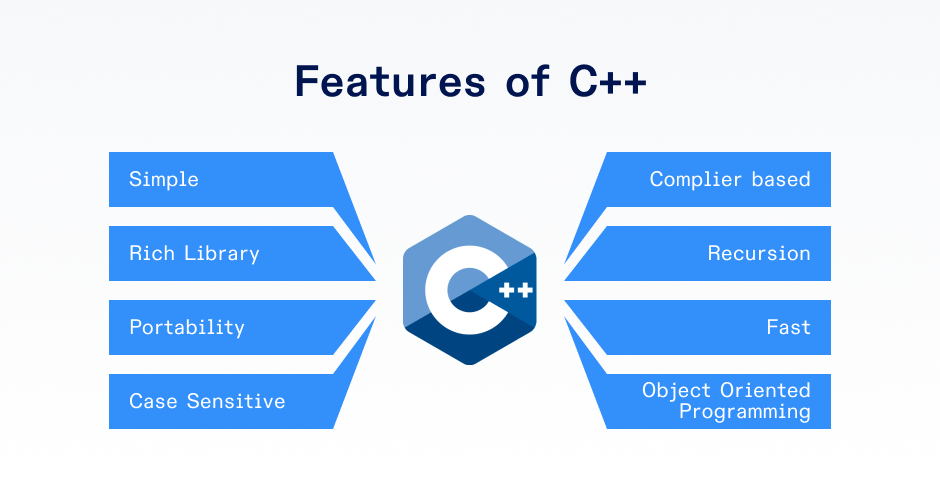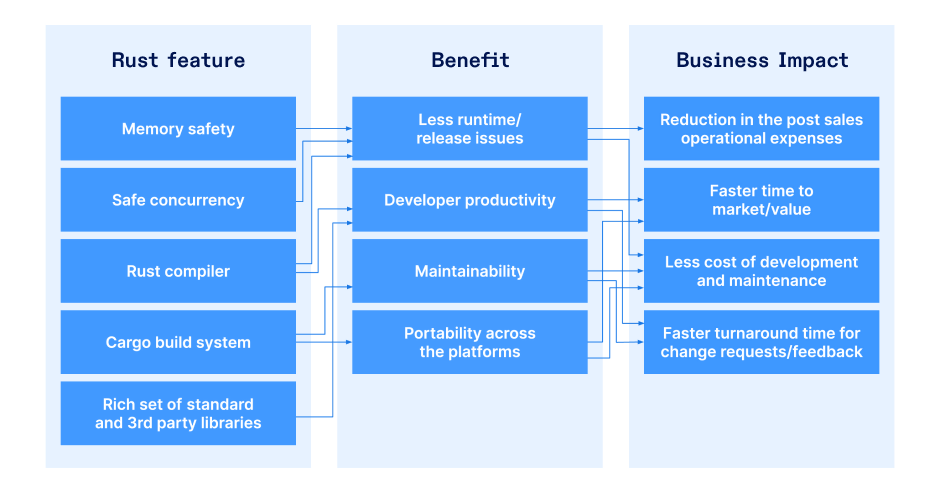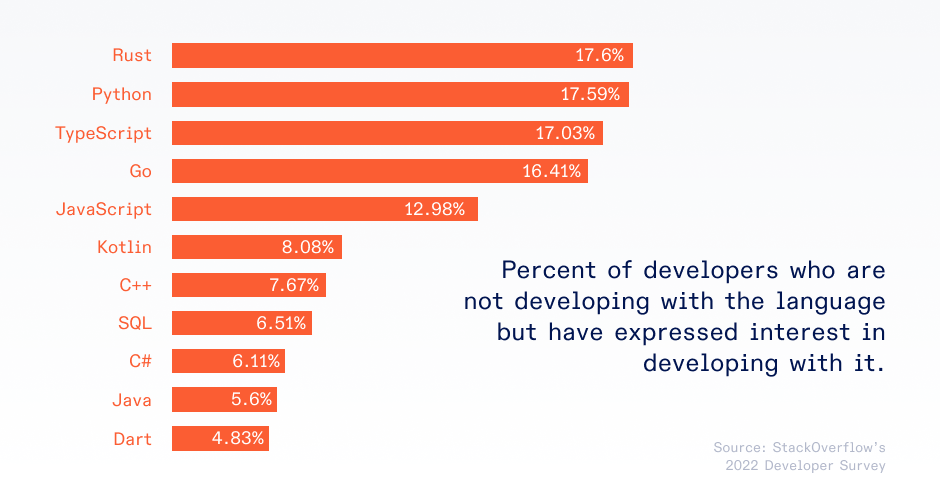The C++ vs. Rust debate is captivating the programming community, and for good reason. C++ has been a long-standing powerhouse in the programming world, boasting a robust community, extensive frameworks, and a wealth of information on its principles. According to the TIOBE Index, C++ is consistently ranked among the top programming languages, holding the 3rd position. It's no surprise that many developers are well-versed in C++ due to its legacy and widespread use.
On the other hand, Rust is a relatively new language, but its popularity is on the rise. According to the Stack Overflow Developer Survey 2021, Rust is one of the most loved programming languages, with 86.1% of developers expressing interest in continuing to work with it. Rust's focus on safety, performance, and concurrency makes it appealing for systems programming and other critical applications.
Both languages offer unique advantages and cater to different needs. Let's dive into this intriguing comparison in more detail.
Get matched with high-performing C++ & Rust developers, 100% vetted and matched to your project requirements, in just 48 hours →

What is C++?
C++ is a versatile, compiled, and statically-typed programming language known for its efficiency and flexibility. It has been a popular choice for various applications, from game development to web development, for many decades. The language's fast performance, reusable code modules, and structured coding approach have contributed to its enduring popularity among developers.
One of C++'s key strengths is its high performance, making it the preferred language for applications that demand fast rendering, such as browsers, banking software, and motion design applications. The language's multi-purpose nature allows it to be used in diverse projects, from building operating systems to creating stunning 3D visuals and video games.
C++ stands out in the field of game development, with major game engines like Unity and Unreal Engine built upon it. The language's ability to handle complex tasks, such as creating operating systems like Microsoft Windows, further showcases its power and versatility.
Additionally, C++ serves as a foundational language for understanding more complex programming languages, making it an essential skill for aspiring programmers. Major tech giants like Adobe, Google, Microsoft, and Apple rely on C++ for various projects.
For C/C++ developers, the earning potential is substantial, with an average annual salary of $106,028 in the United States as per Zippia. This reflects the strong demand for skilled C++ programmers in the job market.

What is Rust?
Rust is a multi-paradigm programming language that emerged as an alternative to C++ after the discovery of vulnerabilities in C++ code. Developed by Firefox, Rust was primarily created to address code and memory safety concerns. However, its capabilities extend far beyond mere protection. Rust emphasizes both speed and security, promoting the creation of "safe code" and offering an efficient compiler for handling large datasets.
Today, Rust has gained significant traction and is widely used by major companies like Meta, Amazon, Microsoft, and many others. According to Stack Overflow's 2023 Developer's Survey, Rust has been voted as the most beloved programming language for an impressive 7th consecutive year, with a remarkable 86.1% of Rust developers expressing their desire to continue using it.

While Rust may pose a steeper learning curve compared to introductory languages, its potential benefits are substantial. As its adoption is expected to grow significantly in the future, learning Rust programming could prove to be a highly valuable skill. In fact, Rust programmers in the United States can earn an annual salary of over $98,691, as reported by Glassdoor.
With its focus on speed, safety, and an ever-expanding community of enthusiasts, Rust presents an exciting opportunity for developers to delve into a cutting-edge and beloved programming language that continues to gain prominence in the tech world.
Get matched with high-performing C++ & Rust developers, 100% vetted and matched to your project requirements, in just 48 hours →
What projects are better suited to C++ & Rust?
What is C++ good for?
C++ is a versatile and high-performance language that finds application in a wide range of projects. Its efficiency and capabilities make it a top choice for various industries and purposes. Here are some notable projects where C++ excels:
- Game Development and Game Engines: C++ is a go-to language for game development, powering some of the most popular and graphically intensive games. Game engines like Unreal Engine and Unity are written in C++, allowing developers to create immersive 3D games, simulators, shooters, and strategy games.
- GPU Computing: C++ is used in GPU-computing projects, including cryptocurrency mining and deep learning. Its performance and ability to handle complex calculations make it suitable for such high-performance tasks.
- High-Load and High-Performance Applications: C++ is well-suited for applications that require fast processing and optimal performance. It is commonly used in applications that deal with real-time data processing, financial systems, and high-performance computing.
Additionally, C++ is utilized in various other areas such as IoT (Internet of Things) applications and devices, desktop applications, and system-level software. It has been the foundation for developing major operating systems like Windows. Notable software packages like Adobe Photoshop & Illustrator, Microsoft Office, and the inner video processing algorithms of YouTube are also built using C++.
What is Rust good for?
Rust is a versatile programming language that adheres to the principles of procedural, parallel, functional, and object-oriented programming. This adaptability makes Rust applicable in various domains, including:
- Client Applications and Web Servers: Rust is well-suited for building efficient and reliable client applications and web servers. Its strong emphasis on memory safety and performance makes it an excellent choice for server-side applications.
- Browsers and Game Engines: Rust is also employed in developing engines for browsers and games. Among the examples of Rust-written operating systems are Redox, RustOS, QuiltOS, BlogOS, intermezzOS. The Mozilla Firefox browser uses Rust in its Servo engine for enhanced performance and security.
- AR/VR and IoT Applications: Rust's low-level capabilities and high-level abstractions make it well-suited for developing applications in the fields of Augmented Reality (AR), Virtual Reality (VR), and Internet of Things (IoT).
- Hardware Programming: Rust is often utilized in hardware programming due to its ability to balance high- and low-level functions, making it useful for embedded or device-based development.
Rust has already made a mark in the industry, with numerous projects and operating systems written in the language. From AR/VR applications to microcontroller drivers and large-scale systems used by companies like Microsoft and Google, Rust proves its versatility and reliability across a wide spectrum of computing needs. Its focus on safety and performance makes it a compelling choice for modern software development.
Calling all C++ or Rust developers! Explore full-time remote opportunities and join our dynamic engineering community for a chance to secure long-term positions with top tech companies. Let's make it happen →
Comparing Rust and C++
Comparing Rust and C++ is important because they share a similar syntax and can be used for many of the same tasks. Developers need to understand the differences between these languages to make the best choice for their projects. Let's explore some key points of comparison:
1. Community and Talent Pool
C++ boasts a significantly larger community, with around 6 million developers, whereas Rust's community is approximately five times smaller, with less than 1.5 million developers. This disparity results in less support for Rust and makes it harder for recruiters to find talented Rust developers. The vast number of C++ questions and answers on platforms like Stack Overflow (over 700k) showcases the strong backing it enjoys from its community. In contrast, Rust's smaller community means its users may encounter more challenges without extensive support, leading to potentially longer development times and higher costs for certain projects.
Verdict: C++ is the clear winner in this category due to its larger and more established community.
2. Cost of Development
Hiring Rust developers tends to be more expensive than hiring C++ developers due to the scarcity of skilled Rust professionals in the job market. Rust developers in the United States can command higher salaries, with an average of $90K, and many earning over $100K per annum. On the other hand, C++ developers face higher competition, resulting in an average salary of around $70K annually. However, both positions can offer high salaries, with rates reaching $120K or more in the U.S. Wages may be more affordable in other regions, such as Eastern European countries.
Verdict: C++. Employing proficient Rust developers can be costlier due to their lower availability compared to C++ developers. However, outsourcing development abroad may offer a solution with platforms like Index.dev.
3. Coding speed
Rust tends to offer faster coding compared to C++ due to its elaborate semantics and focus on preventing undesired behaviors. C++ can present challenges in avoiding undefined behaviors, potentially leading to longer coding times. However, it's important to note that this advantage in coding speed mainly applies to skilled developers.
Verdict: Rust gets a point here as it allows easier coding.
4. Code quality and security
Rust's statically-typed nature and rigorous code validation process indeed give it a significant advantage in terms of code quality and security compared to C++. Rust's superior code validation measures, especially catching potential problems early in development, contribute to a smoother and more efficient development process. This emphasis on code quality aligns well with the needs of modern software development, where identifying and addressing issues early can save time and resources.
Verdict: Rust gains an advantage in this category as it provides more rigorous code validation measures and can be quicker to code for skilled developers.
5. Performance
Rust surges ahead in performance, owing to its robust safety measures that streamline development and bolster security. Unlike C++, which lacks automatic garbage collection, Rust's safety features convert code flaws into compile-time errors, precluding runtime disruptions.
- Safety and Error Handling: Rust's preemptive error prevention through compilation sets it apart, whereas C++ relies more on manual error management, potentially exposing projects to runtime issues.
- C++ Efficiency: C++ excels in efficiency and rapid execution, making it ideal for high-performance applications. Proficient C++ developers leverage its standard codebase for speedy application development.
- Memory Management: Rust's ownership analysis and memory checks, along with absence of "stop-the-world" garbage collection, alleviate memory challenges. In contrast, C++ mandates manual memory management, which can be intricate and resource-intensive.
Verdict: Rust Prevails. While C++ is renowned for speed, Rust competes strongly. A 2021 survey found 75% of respondents deeming Rust's performance on par with or surpassing C++.
6. Compilers
In the realm of programming languages, both C++ and Rust stand out as versatile choices, catering to a variety of platforms, including Windows (32 and 64-bit), Mac, and Linux. While C++ boasts a larger pool of compilers, Rust holds a unique advantage due to its LLVM-based compiler. This distinctive trait empowers Rust to thrive in any environment compatible with LLVM, which encompasses an extensive range of scenarios, such as its successful integration into the real-time VxWorks environment.
A defining aspect of the Rust project is its structured approach to target support, organized into three tiers. The premier tier garners the Rust project's full certification assurance, exemplifying their commitment to quality. In contrast, the C++ standard committee does not involve itself in the certification of compilers or the provision of testing frameworks. While C++ compiler vendors generally uphold the language standard, minor discrepancies may arise, especially when incorporating new language features. Thanks to C++'s widespread adoption, any such discrepancies are swiftly identified, reported, and rectified, thanks to the vigilant community.
Verdict: To guide your decision-making, the advice is straightforward: align your choice with the capabilities of your environment. If Rust is compatible with your setup, its advantages could offer substantial benefits, considering its strong foothold in many relevant environments.
7. Concurrency
C++ boasts speed and resilience with abundant libraries like the C++ Standard Library and Boost. However, Rust's memory safety reigns supreme in preventing data races, those elusive concurrency bugs.
Verdict: The choice? It hinges on your stance. C++ gives freedom, Rust offers safety. Balancing both depends on your project's needs and the team's comfort zone.
8. Memory safety
In the memory safety arena, both Rust and C++ have evolved over time. C++, once bereft of memory safety, evolved with updates like RAII, shedding manual memory management. However, lingering memory safety issues persist despite these changes. Rust, in stark contrast, tackles memory safety adeptly via its ownership system, erasing the need for manual memory management. Rust's built-in functions streamline management procedures, unlike C++. Rust's memory safety focus yields cleaner, more reliable code, a shield against bugs like null pointer dereferences and buffer overflows. C++, while updated, places a heavier burden on programmers, who must handle memory management diligently to avoid potential vulnerabilities.
Verdict: Rust emerges as the champion of memory safety. Its robust ownership model and built-in support make it a superior choice, mitigating pitfalls that C++ programmers must navigate with careful precision.
Also read: Python vs Java for App Development
Rust's rising tide, C++ still reigns
Comparing Rust and C++ is a complex task, demanding consideration of numerous factors. For those seeking robust support and an array of frameworks, C++ remains a potent choice. Conversely, if security and memory leak prevention are paramount, Rust's allure shines through. Both languages offer speed, with C++ enjoying higher popularity.
Rust's ascent is undeniable, yet it trails behind the C++ juggernaut. Enterprises contemplating Rust alongside their established C++ infrastructure aim to leverage Rust's strengths while preserving existing investments. This dynamic is visible even within corporate giants like Microsoft. Rylan Levick of Microsoft highlights the shift from C++ to Rust due to memory safety concerns. However, Gabriel Dos Reis, a Principal Software Development Engineer at Microsoft, shares a different view, affirming Microsoft's steadfast commitment to C++ even as Rust experiments continue. The interplay between these languages within a large corporation illustrates the nuanced approach to embracing Rust's potential, while C++ maintains its reign as the incumbent.
Need further guidance?
Reach out to Index.dev. Feeling uncertain about the right programming language for your project? Connect with our expert matchers and software consultants at Index.dev. We're here to understand your idea or product and provide a comprehensive solution for hiring top-tier C++ or Rust developers from Europe and LatAm.
Our goal is to not just help you pick the right technology stack, but also ensure alignment with industry standards. Let us simplify your hiring process and find the perfect fit for your needs.
For senior developers seeking remote C++ or Rust jobs with leading US and UK companies, Index.dev can help you find the perfect opportunity quickly. Our engineers enjoy competitive salaries that surpass the market average in most countries. Register now to know more →